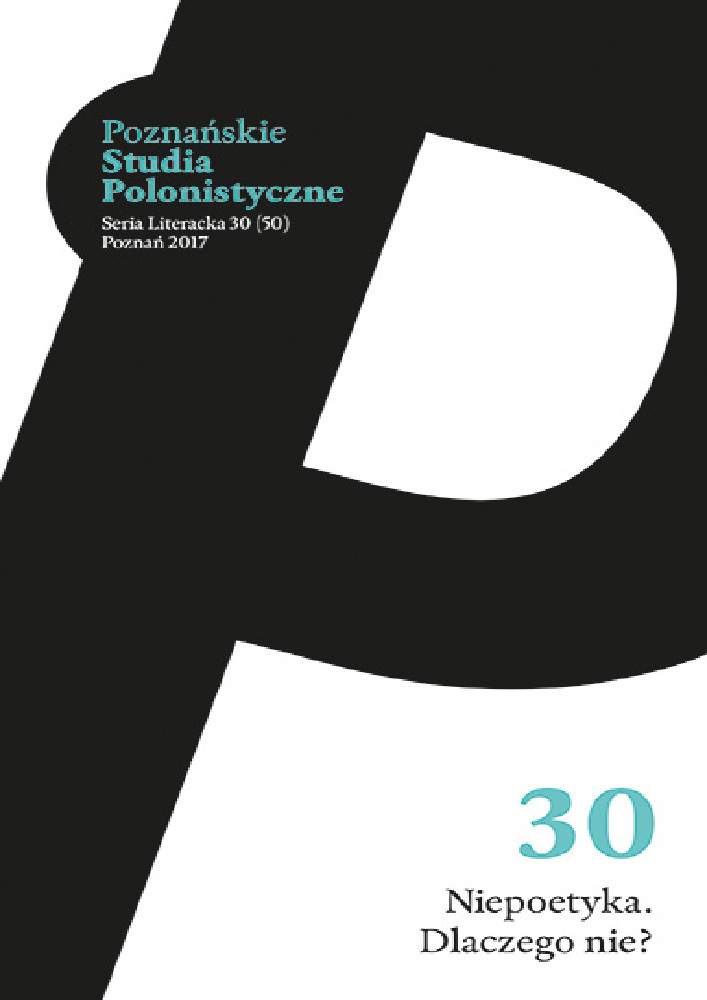Abstract
Poetics proposed by structuralists at its best did not respect its own premises in a dogmatic manner. It profited knowledge that today’s Theory (or so-called Post-Theory) considers helpful while dealing with the text. Unlike approaches held on metodologically narrow perspective, the heterogenic Post-Theory has a capacity for the reneval because it pays due regard to the consideration of paratopia of literaty text. It often happens that post-Theory is accused of obscurity and hermeticism, but „ignotum per ignotum, obscurum per obscurum rhetorics” is not always a vice, sometimes it seeks to respect the mystery of the text and its secret language.References
Bal Mieke (2012) Wędrujące pojęcia humanistyczne, przeł Marta Bucholz, Narodowe Centrum Kultury, Warszawa.
Baugh Bruce (2005), Theory [hasło], w: The Deleuze Dictionary, ed. Adrian Parr, Edinburg University Press, Edinburg [Szkocja], s. 276.
Culler Jonathan (1998), Teoria literatury, przeł Maria Bassaj. Prószyński i Ska, Warszawa.
Derrida Jacques (2015), The Future of the Profession or The University Without Condition, w: Deconstructing Derrida. Tasks for the New Humanities, ed. Peter Perciles Trifonas, Michael Adrian Peters, Pallgrave McMillan, New York [Stany Zjednoczone].
Greenblatt Stephen (2007), Shakespeare. Stwarzanie świata, przeł Barbara Kopeć-Umiastowska, W. A. B., Warszawa.
Jay Paul (2014), The Humanities „Crisis” and the Future of Literary Studies, Palgrave Macmillan, New York [Stany Zjednoczone].
Lipszyc Adam (2012), Przedmowa, w: Walter Benjamin, Konstelacje. Wybór tekstów, Wydawnictwo Uniwersytetu Jagiellońskiego, Kraków.
Maingueneau Dominique (2015), Dyskurs literacki. Paratopia i miejsca wypowiedzenia, przeł. Hanna Konicka, Wydawnictwo IBL PAN, Warszawa.
Mowitt John (2006), Offering Theory, „Canadian Review of Comparative Literature/Revue Canadienne de Littérature Comparée” CRCL/RCLC, [dostęp: 17 maja 2016], https://journals.library.ualberta.ca/crcl/index.php/crcl/article/view/10701/8258.
Nycz Ryszard (2012), Kulturowa natura, słaby profesjonalizm, w: Kulturowa teoria literatury, red. Ryszard Nycz, Michał Paweł Markowski, Universitas, Kraków.
Scutenaire Louis (2016), Moje zapisy (1943-49), przeł. Maryna Ochab, „Literatura na świecie”, nr 1-2.
Sobolczyk Piotr (2012), Sławiński, Białoszewski, interpretacja, „Teksty Drugie”, nr 6.
Zaleski Marek (2015), Estetyka zmąconych emocji, czyli estetyka zwykłości – o Dorocie Masłowskiej dwukrotnie, w: Historie afektywne i polityki pamięci, red. Elżbieta Wichrowska, Anna Szczepan-Wojnarska, Roma Sendyka, Ryszard Nycz, Wydawnictwo IBL PAN, Warszawa, s. 95-138.
Zieliński Tadeusz (1970), Po co Homer? Świat antyczny a my, wybór
i posłowie Andrzej Biernacki, Kraków.
License
Authors
Authors of texts accepted for publication in „Poznańskie Studia Polonistyczne. Seria Literacka” are required to complete, sign and return to the editor's office the Agreement for granting a royalty-free license to works with a commitment to grant a CC sub-license.
Under the agreement, the authors of texts published in „Poznańskie Studia Polonistyczne. Seria Literacka” grant the Adam Mickiewicz University in Poznań a non-exclusive, royalty-free license and authorize the use of Attribution-NoDerivatives 4.0 International (CC BY-ND 4.0)Creative Commons sub-license.
The authors retain the right to continue the free disposal of the work.
Users
Interested Internet users are entitled to use works published in „Poznańskie Studia Polonistyczne. Seria Literacka” since 2016, for non-commercial purposes only, under the following conditions:
- attribution - obligation to provide, together with the distributed work, information about the authorship, title, source (link to the original work, DOI) and the license itself.
- no derivatives - the work must be preserved in its original form, without the author's consent it is not possible to distribute the modified work, such as translations, publications, etc.
Copyrights are reserved for all texts published before 2016.
Miscellaneous
Adam Mickiewicz University in Poznań retains the right to magazines as a whole (layout, graphic form, title, cover design, logo etc.).
